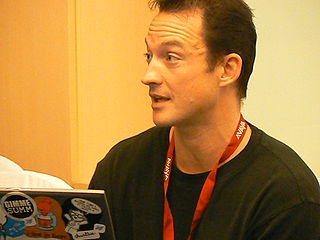A Quote by George Pattison
I think he [Heidegger] sets the question up in a useful way and, despite appearances, he's not 'against' technology. He just wants us to have a questioning and thoughtful relation to it. This must be relevant to any approach.
Related Quotes
When an individual is taken into custody or otherwise deprived of his freedom by the authorities in any significant way and is subjected to questioning... He must be warned prior to any questioning that he has the right to remain silent, that anything he says can be used against him in a court of law, that he has the right to the presence of an attorney, and that, if he cannot afford an attorney one will be appointed for him prior to any questioning if he so desires.
You must set up measurement of results and celebrate small victories as you go along. I have observed that any creativity initiative gets about an eighteen-month grace period. If there aren't any tangible results in a year and a half, despite the strongest commitment, someone in the organization is going to start questioning the whole program.
I preach that anybody can improve their lives. I think God wants us to be prosperous. I think he wants us to be happy. To me, you need to have money to pay your bills. I think God wants us to send our kids to college. I think he wants us to be a blessing to other people. But I don't think I'd say God wants us to be rich. It's all relative, isn't it?
Like Nietzsche, Heidegger also gave up on the prospect that schools and universities would nurture the kind of reflective openness to the way of things that, certainly by the 1940s, he identified with authentic thinking. The authentic person is not the Promethean, iron-willed figure that pops up in Nietzsche, but someone more like the Daoist sages whom Heidegger admired.
If it had been anything else, we would have said, 'People don't want us to do it. Forget it. Let's just leave it alone.' But this is not in that category. This is interesting science. New science. With a hint of a possibility of a very useful technology. Therefore, if you've got any integrity, you don't give up. You only give up if you find you are wrong. But as long as you believe that you are right, you have to continue. And you have to take the consequences.
I think actually any morality system that rewards only the extremes is a flawed system. Players don't approach life that way, they don't approach games that way, and they shouldn't be trained to approach games that way. They shouldn't be in the mode where, "I've got to choose every good option." They should just play the game. And they should get equal consequences or rewards for that, that are different from the extremes.
I think, actually, any morality system that rewards only the extremes is a flawed system. Players don't approach life that way, they don't approach games that way, and they shouldn't be trained to approach games that way. They shouldn't be in the 'Star Wars' mode where, 'I've got to choose every good option.'
Everybody has to solve that "meaning of life" and purpose question for themselves. Everybody does it their own way. I think you have to be thoughtful about the way that you're doing it. So I describe it as purpose. If you can think about leading a purposeful life - not just an accumulation but you actually make the world a better place - then I think in the grand scheme of the universe, that that explains our existence. If not, we're just passing through. We're grains of sand and we're blowing in the breeze.































